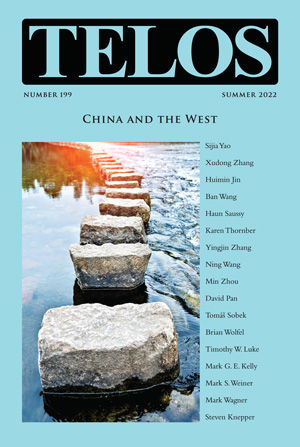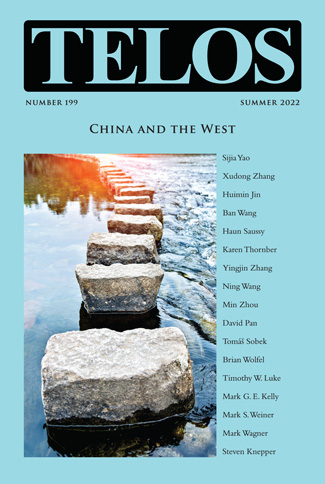In today’s episode of the Telos Press Podcast, David Pan talks with Ban Wang about his article “The Clash of Civilization and World Community: The West and China,” from Telos 199 (Summer 2022). An excerpt of the article appears here. In their conversation they discuss whether it still makes sense to speak of distinct human cultures; if the very ideas of China and the West need to be discarded, or, if not, what the basis of such distinctions would be and why they persist; whether there is a human commonality that lies below and beyond age-old cultural norms, and if so what is its content and what forms does it take; how both Chinese and Western forms of universalism have converged to form a cosmopolitan unity; how multiculturalism and identity politics have undermined cross-cultural interaction and a universalist vision; and what alternatives there are for affirming both universalism and local culture. If your university has an online subscription to Telos, you can read the full article at the Telos Online website. For non-subscribers, learn how your university can begin a subscription to Telos at our library recommendation page. Print copies of Telos 199 are available for purchase in our online store.
|
In today’s episode of the Telos Press Podcast, David Pan talks with Tomáš Sobek about his article “Tolerance as Suppressed Disapproval,” from Telos 199 (Summer 2022). An excerpt of the article appears here. In their conversation they discuss the difference between a moral norm and tolerance as well as the consequences of this difference for understanding tolerance; tolerance as a second-order attitude that involves a suppression of disapproval; how excessive tolerance can be wrong; the difference between positive and negative liberalism; and whether negative liberalism is opposed to or destructive of moral norms. If your university has an online subscription to Telos, you can read the full article at the Telos Online website. For non-subscribers, learn how your university can begin a subscription to Telos at our library recommendation page. Print copies of Telos 199 are available for purchase in our online store. In today’s episode of the Telos Press Podcast, David Pan talks with Mark G.E. Kelly and Timothy W. Luke about the Russian invasion of Ukraine and its consequences for world order. Our current issue, Telos 199 (Summer 2022), features essays by Luke, Kelly, and Pan on the war in Ukraine, excerpts of which appear here. Click through to read the full articles at the Telos Online website (subscription required). To learn how your university can subscribe to Telos, visit our library recommendation page. Print copies of Telos 199 are also available for purchase in our online store. Telos 199 (Summer 2022): China and the West is now available for purchase in our store. Individual subscriptions to Telos are also available in both print and online formats.
It would be a mistake, though, to see China and the West as polar opposites or competing civilizations, separated by their opposing political interests on the one hand and by the history of each of their cultural traditions on the other hand. Even if they had separate long histories, the recent past has seen many more opportunities for interaction and orientation around common projects and problems. Moreover, since the past is always a projection from out of the present, the idea of a clash of civilizations is not a legacy but a project. An alternative endeavor would be to conceive of the relationship between China and the West as existing within a larger totality. The definition of such a totality must occur within a particular perspective, however, and therein lies the problem. China and the West are clearly competing to define the framework of global order. Consequently, any attempt to consider the relationship between the two must look to the vision of universality that each side is trying to establish against the other. This issue of Telos considers a variety of ways of defining the overarching perspective from which the comparison between China and the West makes sense. |
||||
|
Telos Press Publishing · PO Box 811 · Candor, NY 13743 · Phone: 212-228-6479 Privacy Policy · Data Protection Copyright © 2025 Telos Press Publishing · All Rights Reserved |
||||




